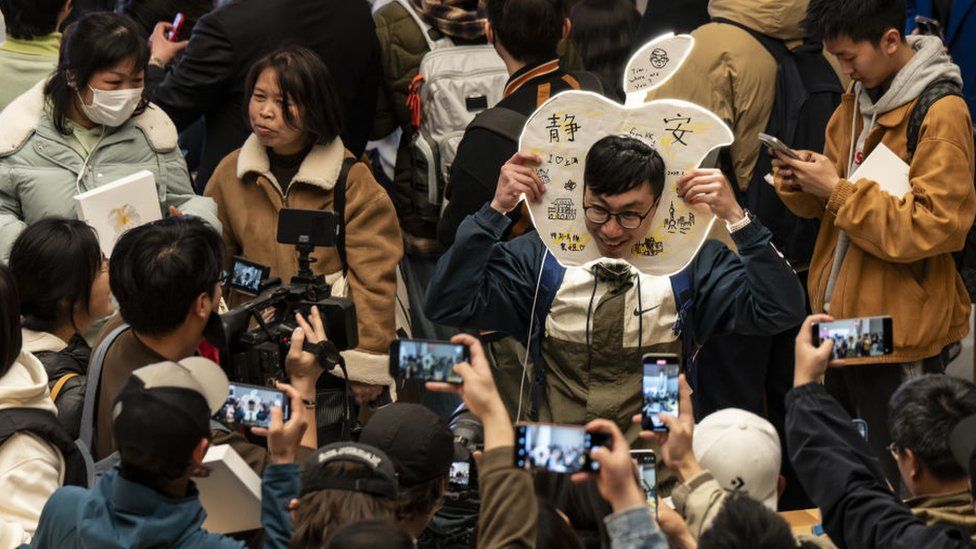ARTICLE AD BOX
 Image source, Getty Images
Image source, Getty Images
Apple has enjoyed a loyal fanbase for decades
By Zoe Kleinman
Technology Editor
To understand how much the US's new lawsuit strikes at the heart of the identity Apple has forged for itself, let's first consider the firm's fanbase.
Apple has a unique position as a tech brand, and is regarded with enormous affection by those who like it.
I've sat through a lot of Apple events in my time, both virtually and in person, and one thing that always makes us journalists raise an eyebrow is the whooping and cheering from the audience every time a new feature, no matter how small or incremental, is announced.
When a new hardware product goes on sale, Apple employees form a guard of honour outside stores and applaud its first buyers - some of whom will have camped outside for hours in advance, and spent thousands of dollars (who else could get away with charging $3,500/£3,499, for a VR headset?).
People get tattoos of Apple's distinctive fruit logo. Windows, Google and ChatGPT symbols appear less popular.
"Apple is like a strange drug that you just can't quite get enough of," wrote Leander Kahney in his 2006 book The Cult of Mac.
It is this "strange drug" or "magical experience", as Apple put it in a statement on Thursday, which is now under fire.
So far, Apple's ethos is a wildly successful business model. As I write, the firm is worth $2.6 trillion.
Analysis firm CCS Insight estimates that 72% of smartphone handsets bought in North America alone in the last three months of 2023 were iPhones. Samsung took 25%, leaving just 3% for everybody else in the handset business.
One of Apple's big selling points is its focus on privacy and security. But the question is whether it achieves this by shutting out the competition.
It routinely blocks web trackers - an an irritation for web users but also an important revenue generator for other digital businesses.
It also operates a "walled garden". This means all Apple products work seamlessly together, and every app, payment method and operating system update is vetted and approved by the tech giant. It is, effectively, a closed ecosystem and that keeps it secure.
Developers fume that they have to pay to get in, and also have to follow Apple's strict rules: but Apple says in return they get access to an enormous marketplace of potential customers.
The music streaming platform, Spotify, and Epic Games, which makes Fortnite, are the two biggest commercial names to make a vocal stand against this. Fortnite was removed from the App Store: Spotify hasn't gone as far, perhaps because it has millions of iPhone-based subscribers.
Apple's biggest smartphone rival is Google's Android, which is a far more sprawling affair. Its operating system has to work across dozens of different devices made by various manufacturers over the years. As a result, it offers more consumer choice - and is inevitably also less secure.
The US Department of Justice (DOJ) is not the only authority deciding to take a closer look at Apple's unique position.
On two occasions now the tech giant has very reluctantly prized open its gates - and both times were caused by the European Union.
Image source, Getty Images
Image caption,Apple employees applaud as customers enter a new store in Hanam, South Korea last year 2023
It was recently forced to open up to other app stores in Europe. It did so very hesitantly, with plenty of warnings about the evil lurking outside of its own digital paradise.
Until recently the iPhone didn't even use the same charging cable as almost everything else - most models require a bespoke lightning cable. But the EU is bringing in a common charger rule, and Apple is now selling lightning cable adaptors, as well as changing its most recent model to far more ubiquitous USB-C port.
The DOJ doesn't have the same power, however.
This will be a court process in which it will have to convince a judge, and it doesn't have a very successful track record of doing that.
"The last time a US court found a Big Tech company guilty of monopolisation dates back to 2001 (Microsoft)," notes Anne Witt, Professor of Law at EDHEC business school in France.
That was about the dominance of Microsoft's web browser Internet Explorer, which was installed by default in millions of machines running Windows.
It's worth remembering, however, that Apple is not holding its customers hostage, forcing them into its embrace.
"Every case against Apple portrays its users as consumers with no free will. I really struggle with that," remarked Carolina Milanesi from tech industry analysis firm, Creative Strategies.
I know I have friends with iPhones who have dismissed the "faff" of changing to another brand, even if they like the look of something different.
But that doesn't mean that Apple is actively stopping them - although a throw-away comment once made by CEO Tim Cook has now come back to bite him.
A reporter in an interview mentioned that he was unable to share a video with his mum, who had a different phone.
"Buy your mom an iPhone," the Apple CEO joked.
Apple has vowed to "vigorously" fight the lawsuit and denies the claims.

 1 year ago
97
1 year ago
97








 English (US) ·
English (US) ·